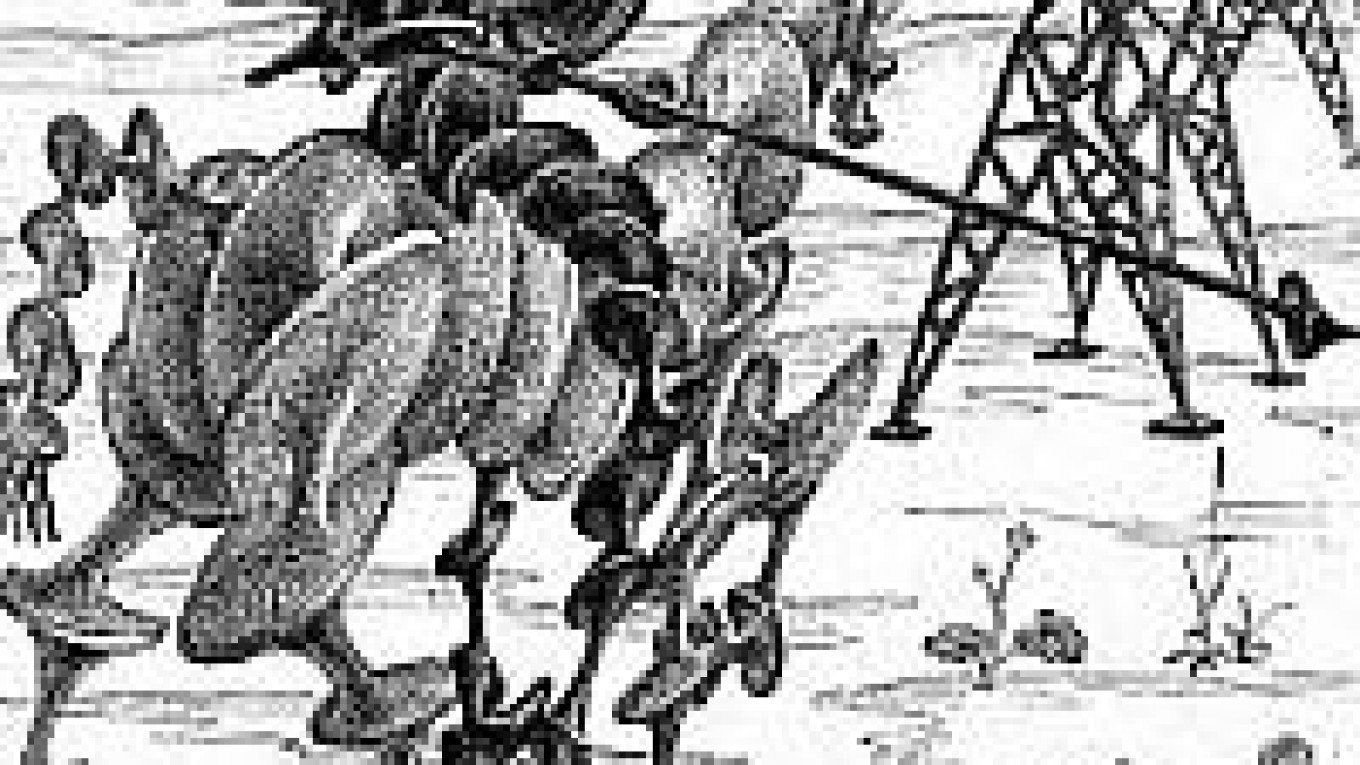Throughout the centuries, prominent Russians such as Fyodor Dostoevsky and Vladimir Nabokov have celebrated the figure of Don Quixote de la Mancha, who was conceived by Spanish author Miguel Cervantes in 1605. Now, some of this reverence can be seen in an exhibition marking the 400th anniversary of Don Quixote's creation. The exhibition is sponsored by the Cervantes Institute, the cultural outreach program of the Spanish Embassy.
The small but charming exhibition consists of movie posters, dolls made by Russian schoolchildren and caricatures drawn by 20th-century Russian artists. These caricatures -- which are perhaps the best illustration of Don Quixote's enduring popularity in Russian culture -- are the work of prominent Russian artists such as Leonid Tishkov, Oleg Tesler and Andrei Bilzho, cartoonist for the daily newspaper Kommersant.
To date, no one can agree exactly what Don Quixote represents, hero or fool. Most famous for tilting at windmills, he stands in for every man who has devoted himself to a lost cause, a fate grander and nobler than what his time and place have allotted him. Of course, perhaps Don Quixote was simply a deluded fool, and perhaps the quest for the grand and noble life was never as lovely as medieval myths would have us believe. Certainly by the time Cervantes wrote, the ideals of chivalry had been flattened into romantic cliches, and the author poked red-hot fun at outmoded concepts such as chivalry, chastity and valor.
The novel that flowed from his pen, however, did more to secure immortality for these fine anachronisms than all the hackneyed prose of his contemporaries in 17th-century Spain. It was precisely Cervantes' concept of grandeur cloaked in ridicule that appealed so much in Russia -- the nation that forgives, indeed, valorizes fools like nowhere else on earth.
Over the years, Don Quixote captured the attention of Russia's best and brightest. Dostoevsky was especially enamored of the Knight of la Mancha, ranking him second behind Christ as the personification of perfect literary beauty. He was working on his own variation of the "Christ as Don Quixote" or "Christ Ridiculous" theme, Prince Myshkin of "The Idiot," when he wrote:
"I'd only mention that of all the beautiful individuals in Christian literature, one stands out as the most perfect, Don Quixote. But he is beautiful only because he is ridiculous. Wherever compassion toward ridiculed and ingenious beauty is presented, the reader's sympathy is aroused. The mystery of humor lies in this excitation of compassion."
The exhibition now on display at the Cervantes Institute, which takes up only one room in the institute's basement, merely hints at the fertile relationship between Russian authors and the knight. But Muscovites may soon be treated to a more thorough treatment of the theme. Victor Andresco, director of the Cervantes Institute, hopes that the exhibition is just a preview of a larger and more permanent collection to come. He is currently seeking space to establish a museum devoted to Don Quixote, Knight of la Mancha, in Moscow.
The Don Quixote exhibition runs to June 30 at the Cervantes Institute, located at 20A Novinsky Bulvar. Metro Barrikadnaya. Tel. 937-1952.
A Message from The Moscow Times:
Dear readers,
We are facing unprecedented challenges. Russia's Prosecutor General's Office has designated The Moscow Times as an "undesirable" organization, criminalizing our work and putting our staff at risk of prosecution. This follows our earlier unjust labeling as a "foreign agent."
These actions are direct attempts to silence independent journalism in Russia. The authorities claim our work "discredits the decisions of the Russian leadership." We see things differently: we strive to provide accurate, unbiased reporting on Russia.
We, the journalists of The Moscow Times, refuse to be silenced. But to continue our work, we need your help.
Your support, no matter how small, makes a world of difference. If you can, please support us monthly starting from just $2. It's quick to set up, and every contribution makes a significant impact.
By supporting The Moscow Times, you're defending open, independent journalism in the face of repression. Thank you for standing with us.
Remind me later.


